From the upstairs windows in Colin MacQueen’s house there isn’t a view of the sea but he can clearly see the ships. Docked in the port, less than half a mile away, they tower over the roofs of flats and houses. “They are colossal,” he said. “These cruise liners are much bigger than the container ships. They use as much fuel as whole towns.”
The view is pretty spectacular. But it’s what he cannot see that worries MacQueen. Like many cities across the UK, Southampton has such poor air quality it breaches international guidelines, and while the government and local authorities are looking to take action on cars, maritime fuel – the dirtiest and most polluting of all diesels – is on no one’s radar. Not only do the giant cruise liners churn out pollutants at sea, they also keep their engines running when they are docked in places like MacQueen’s home town.
“Then there are the passenger vehicles and the hundreds of HGV trucks coming into the port every day,” said MacQueen, a Clean Air Southampton campaigner. “On some days Southampton just grinds to a halt because of the volume.”
Britain is in the midst of something of a seafaring renaissance, with a growth in seagoing freight and an explosion in the holiday cruise market. Around the country, docks including those at Plymouth, Liverpool, Greenwich, Orkney, Edinburgh and Hull are proposing or working on expansions to accommodate more and bigger cruise and cargo ships.
The number of Britons taking cruise holidays is estimated to surpass 2 million this year, double the number a decade ago. Globally, some 25 million people set sail last year, up by 10 million in a decade.
Once seen as a reserve for the rich and elderly, cruises now draw a wide variety of holidaymakers, said Andy Harmer, UK director of the trade body Cruise Lines International Association. “There is now a huge choice, from small expedition cruises of 100 guests to places like Borneo and Antartica, to the 6,000- plus guests going to the Med and Baltic, with absolutely everything on board.
“More and more places are opening up for tourists: there are now 50 ports in the UK and Ireland that people on cruises can visit, and 19 cruise ports they can drive to to start their holiday. It’s convenient and easy, and you can take all your luggage in the car right to the ship. Everything is on board for the whole family and you sail to great places. It’s a bit like the aviation industry: once everyone had to go to Heathrow or Gatwick, but then the regional airports opened up and it all became more accessible. The same thing is happening with cruises.”
Harmer insisted that the industry was taking the consequent environmental concerns seriously. “We are ahead of the game in terms of technologies being invested in – certainly compared with resort-style hotels on land. Cruise ships have their own water treatment, everything is recycled and it is in our interests to maintain the cleanliness of the ocean.”
For maritime towns, the issue is fraught, given the benefits the great ships bring. A campaign to stop the construction of a cruise terminal in Greenwich, south east London, failed last year, despite evidence of its impact on air quality. Almost 10,000 Londoners die prematurely every year due to air pollution. This weekend it was claimed the capital breached annual air pollution limits just five days into 2017.
“Unlike for airports, railways and roads, the Department for Transport does not provide clear guidance on which ports should be prioritised for expansion, but generally supports growth,” said Melissa Moore, policy head at the Marine Conservation Society. “This lack of strategy, and competition between ports, results in most trying to develop to attract cruise liner and shipping business.
“Ever-larger ships necessitate capital dredges to expand navigational channels, which can result in habitat removal and smothering as well as increased CO2, sulphur and nitric oxides [SOx and NOx] emissions in the region.
“The estuaries and harbours that house these ports are often marine protected areas. While habitat creation can sometimes compensate for damage, a more strategic approach would reduce pressures on the marine environment, as well as on climate and human health.”
Dr Matt Loxham, an ocean and earth scientist at Southampton University, points out that it is not just ports but also Britain’s coast-hugging shipping lanes that create pollution, and these are not being measured, or considered in official air quality analysis. “We pay a lot more attention to cars – probably rightly. But it means we know a lot more about what comes out of a car than what comes out of a ship. Unlike with car diesel, we don’t really understand the health implications from the pollutants and particle types.
“These big ships can be moored for several days as they load up, with engines idling. There is clearly a tightrope to be walked between quality of life for people and jobs and benefits to a city.”
German environment group Nabu claims one medium cruise ship emits as many pollutants as five million cars going the same distance. It says the ships belch out 3,500 times more sulphur dioxide than cars – although international rules to reduce sulphur emissions in shipping are due to come into force in 2020.
Areeba Hamid, a Greenpeace UK air pollution campaigner, said: “Shipping has long been a destination for low-quality fuel that no one would be allowed to burn on land. If ports want to expand, they need to demonstrate that they are not going to worsen people’s exposure to harmful pollution, or they must insist that ships using their ports have much higher standards than those currently in force.”
For MacQueen, local ecomony benefits are not enough. “We are surrounded by water, but you can hardly get to it: the marine development dominates. So you have in our city a massive money-making concern but there seems to be little trickle-down. It could be having a massive impact on our health and we are in thrall to it.”




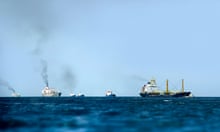

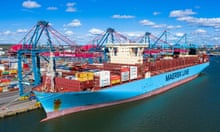
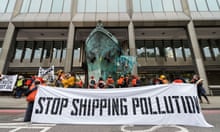
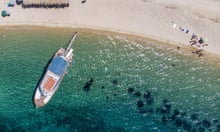
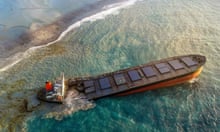
Comments (…)
Sign in or create your Guardian account to join the discussion